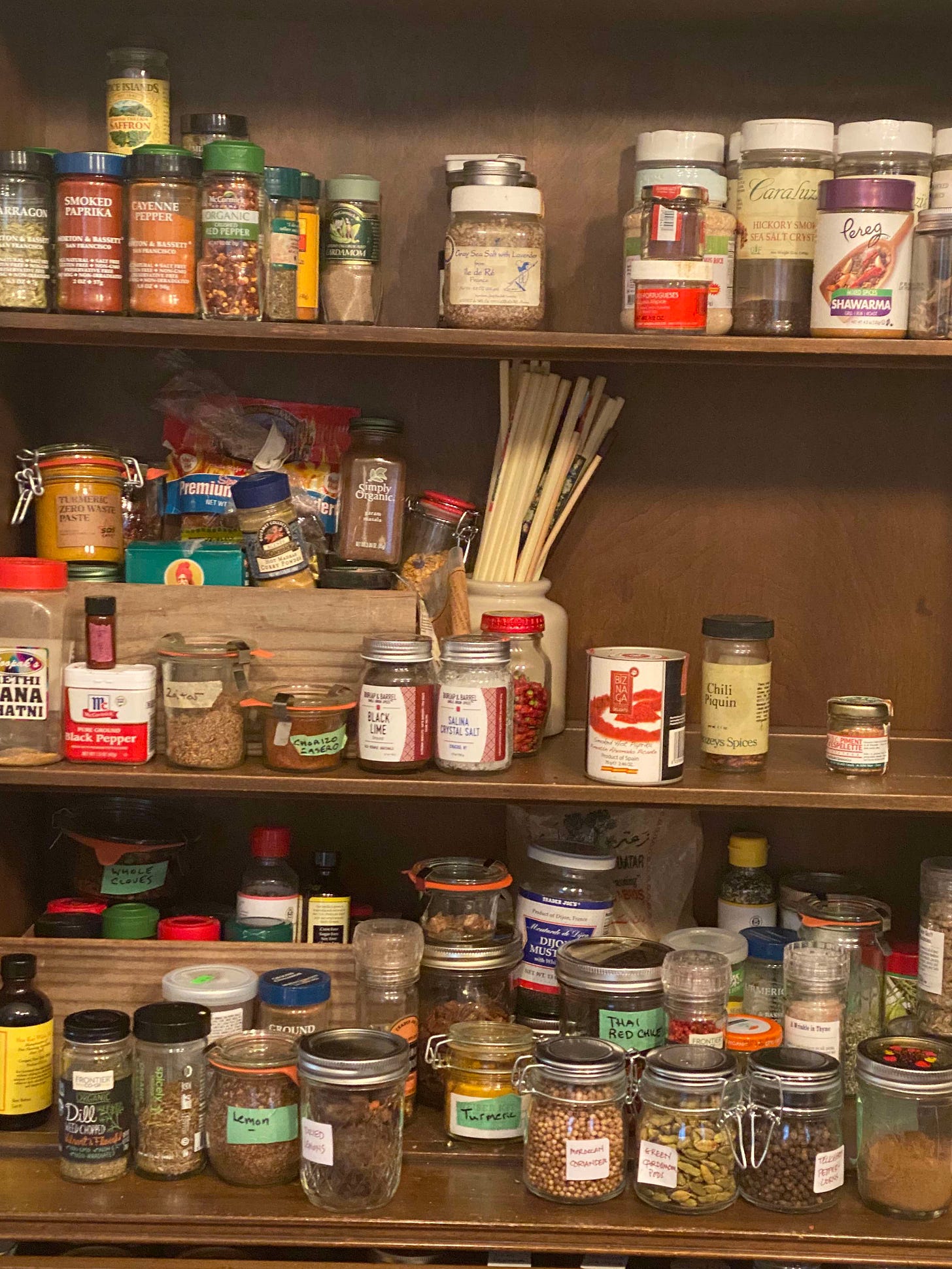It’s generally pretty quiet here on the weekend. We try to sleep in, take Pete on a long walk, have breakfast, and, if we’re not visiting friends or family, work in the yard, the garden, or on the house. (As I write this, Susan is in the kitchen, re-organizing the spice cabinet, which either means she’s a Virgo rising, or she’s incredibly bored, or both.) I have a lot of work catch-up to do after spending four days in a studio recording the tenth anniversary edition of Poor Man’s Feast. But recently, I made a promise to Susan, and to myself: at least one weekend day will be spent disconnected from email. Because, as a writer, it is really easy for me to never, ever stop looking — even on Sunday — because the writer’s life never rests: between writing my next book, writing essays, teaching, waiting for answers on pieces that are sitting out there in the great Vacuum of Doom (it’s like the Zoom waiting room for authors: we submit pieces, often commissioned, and….crickets because the editor left, or the fifteen year old office intern forgot to tell you that the issue of the journal you’re waiting to hear from was postponed for a year, or your piece went into spam, etc etc. etc. etc.), it’s hard to stay away from email, even for a day.
I tried to convince myself that if I set up my notifications so that I’d know when something important came in without having to open up the Gmail app on my phone, I’d be abiding by my own rules, but you know how that goes: notifications — banners, bells, beeps, all of them — are like a digital version of Tantalus’s grapes: it’s just going to make you that much more addicted, and that much more likely to open the app. It’s like when I used to tell my friends in recovery that I was planning on moderating my wine consumption and they’d say Yeah let us know how that goes for you.
But I decided recently that I needed one day a week to step away, to back up, to read actual paper books and get recipes from actual cookbooks instead of doing web searches for, say, Szechuan dry stringbeans or turkey meatballs. So that’s what I did: I closed up shop for a day, and I let everyone know who needs knowing that I wasn’t looking at my phone on Sundays anymore, except to use it as it was meant: as a phone. Or a camera. Or as a pedometer, or an impulse book-buying device.
They’re not boundaries if you don’t hold to them, Susan said.
And just like that, almost immediately: alerts started coming in. Notifications: you have six new emails marked IMPORTANT. An hour later: you have eight new emails marked IMPORTANT.
They’re not boundaries if you don’t hold to them, Susan said, and of course, she was right. She’s always right about this stuff. So I ignored my phone and we went out to the diner for waffles and I left my phone in the car. After brunch, another notification: you have ten new emails marked IMPORTANT.
At this point, I couldn’t contain myself; I manage my mother’s affairs and when I was in Maine a few weeks ago, there was an emergency that involved her apartment. I have older cousins who hate texting. A dear friend who’s been unwell. A bunch of grant applications awaiting decisions. So screw it, I thought, I’ll look. And there, in my inbox, were the six original emails, followed by two more, checking to see if I’d gotten the ones they’d sent (Please confirm), and then, two more follow ups from two of the other senders. In total: ten emails sent with importance, four of them follow-ups. When I didn’t respond — my intention was to take Sunday off from screens and I’d told them this — they became insistent; their tone changed; at least two of them were actually angry that I was not available to discuss with them the thing they were writing to me about at that very moment (which could have waited until Tuesday).
What the hell is this—National F**k Your Boundaries Day? I asked Susan.
Why don’t you shut your phone off, or put up an out of office message, she said.
And I would, except, what would happen if someone needed to get in touch?
I grew up a chronic people pleaser; Allison Moorer has written about this here, and the first time I read her words about this condition, it was instant recognition. Anne Lamott calls it being an emotional flight-attendant. What can I get you? How can I help? Go ahead—I’ll wait out here in the rain; you take the taxi—I’ve got a plastic bag to cover my foot-to-hip cast. Not a problem. People pleasing usually is connected to trauma, or growing up in a complicated household, meaning: everyone shouting at each other or addictions that everyone pretends not to see or seething foundational tension or all of the above. People pleasers don’t want to make waves. We want to be perfect because then everyone around us will love us and won’t that be swell. And then, when we don’t get the coveted response — the love response — we get angry and surly and maybe even a little bit passive aggressive.
What can I get you? How can I help? Go ahead—I’ll wait out here in the rain; you take the taxi—I’ve got a plastic bag to cover my foot-to-hip cast. Not a problem.
Over time, I’ve made a concerted effort to notice my actions, my expectations, and how they impact my day to day; there are certain things I’ve been extremely firm on, like realizing when someone has actually been a longtime total s**t to me rather than just having a chronically crappy day, and getting some perspective on the relationship. Or drawing the line in the sand when someone from my past cancels a dinner date for the fortieth time because of a stomach bug, and then posts social media pictures having dinner with someone else. Or when a family member I never see shows up at my house with a copy of my father’s will and answers Yes! when I ask why she has a copy of my father’s will. Or when my (former) cardiologist used to arrive a full hour late for my appointment whether I was her first patient or her last. None of these situations is okay, or even remotely acceptable, but I do own my side of the street now where even two years ago I’d be all FINE NOT A PROBLEM! HAVE AT IT AGAIN!
I’m upfront now about the boundaries I set: if I do not intend to work on a weekend day, I say so. And what I’ve discovered is this: people don’t like it. If you’ve set a boundary, people will often go out of their way to either ignore it completely, or poke at it to see how far they can push before you cave, because: you always cave. Those are the rules.
Until you change them.
And this is what happened today: ten emailers turned into Glenn Close in that scene in Fatal Attraction. I will NOT be ignored. It was like someone had cloned my mother.
In the end, Susan is right: I should have shut the phone off completely. And one day, maybe I will. For now, though, someone may need to reach me.
RECIPE
Ali Slagle’s Turmeric Black Pepper Chicken with Asparagus
Adapted from The New York Times
It would make sense to include a comforting recipe here, and so I am: Ali Slagle’s mind-blowing Turmeric Black Pepper Chicken with Asparagus, originally published in the New York Times. There are a ton of variations — you can make it with tofu or pork, and peas instead of asparagus — but we hew to the original, over white rice. Our only change is that we use coconut oil instead of canola, and rice flour for dredging: the result is a crispier chicken (or tofu, or pork), and it’s gluten free.
Makes 4 servings (we have doubled it for the leftovers)
3 tablespoons honey
¾ teaspoon black pepper, plus more to taste
Kosher salt
2 tablespoons rice (or all-purpose) flour
1½ teaspoons ground turmeric
1 pound boneless, skinless chicken thighs, cut into 1-inch pieces
1 tablespoon coconut
12 ounces asparagus, trimmed and thinly sliced on an angle
1 teaspoon unseasoned rice vinegar
1 lime, cut into wedges (optional)
In a small bowl or measuring cup, stir together ¼ cup water with the honey, pepper and ½ teaspoon salt; set honey mixture aside.
In a medium bowl, stir together the flour, turmeric and 1 teaspoon salt. Add the chicken and toss until coated.
In a medium (10-inch) nonstick skillet, heat the oil over medium-high. Add the chicken and cook until the turmeric is fragrant and the chicken is golden brown on both sides, 2 to 3 minutes per side. Add the asparagus, season with salt, stir to combine and cook until crisp-tender, 1 to 2 minutes.
Add the honey mixture and cook, stirring, until the chicken is cooked through and the sauce has thickened, 2 to 3 minutes.
Remove from heat and stir in the vinegar, if using. Season to taste with salt and pepper. Serve with lime squeezed over top, if you like.









I just want to say (hopefully reassuringly) that I never check my emails on a Sunday or a Saturday, and nothing bad has happened. The most important people in my life - the people who are allowed to create emergencies for me - have my number. Everyone else can wait. It should not be a privilege to be able to create boundaries as simple as that, but it seems like it is right now.
Sad story: We are all addicts to phones and computers. I like the idea of shutting off for a day or two. We'll see how that goes....ha.